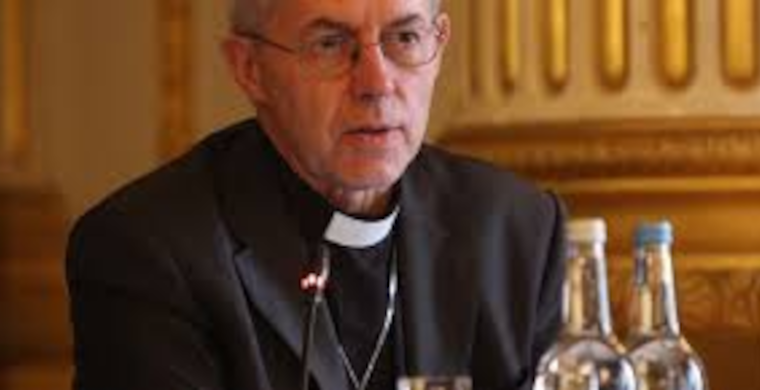THE FALL OF ARCHBISHOP WELBY
By Carl R. Trueman
FIRST THINGS
November 14, 2024
Justin Welby, Archbishop of Canterbury, resigned on Tuesday after an investigation found he'd mishandled the John Smyth abuse scandal. The resignation is a shock but, for those aware of the story, not a surprise. One of the vices I developed as a teenager and have maintained for over forty years is reading the British satire and investigative magazine Private Eye. The Eye has been writing for years about Smyth; about how he brutalized young men at the Christian Iwerne Minster summer camps, where he volunteered; about his convenient departure to Zimbabwe; and about the very real possibility that he was involved in the death of a child there.
Iwerne Minster camps were a peculiarly English cult. Leaders exerted remarkable control over the promising young men unfortunate enough to come under their sway. The camps were specifically designed to train young men from the most elite public (that is, extremely expensive and rather private) schools for leadership in the Anglican evangelical world. They were deeply suspicious of theology, of intellectual engagement with the faith, of traditional Anglican forms, and were focused almost exclusively on evangelism. Ecclesiology was virtually non-existent: One was loyal to the big personalities who dominated Iwerne culture, not to bishops or archbishops.
Lower middle-class riffraff such as myself need never have applied. Iwerne was, thankfully, not open to us. The camps do deserve credit for giving the world Rev. John Stott, but they also established an old boy network that dominated Anglican evangelicalism in England for decades. And under cover of this, they gave the world John Smyth and his ilk.
Because the English ruling establishment looks after its own, Smyth and his fellow abusers enjoyed diplomatic immunity, not merely in the church but, if the Eye is to be believed, at the highest level of the English establishment. After all, Smyth's escape to Zimbabwe in 1984 after his crimes were exposed within elite circles in the church was very easy and convenient. As I watched the Eye's reports over time, it became patently obvious that other names would be pulled into the scandal, names of men that had been revered in the Iwerne-dominated Christian world. Iwerne trained its men for the plumb jobs. It operated on a system of patronage. And to upset the patrons was to sink one's career.
And so it proved. After Smyth, the most high-profile figure in the church abuse scandal has been Jonathan Fletcher, sometime vicar of Wimbledon. I remember being at a conference and observing the dynamics between Fletcher and his acolytes. He enjoyed the power just a little too obviously for my comfort. Decades later, he now faces criminal charges for alleged offenses similar to Smyth's. And reports of the scandals are shocking only in their predictability: These men and their sycophants so closely identified their ministries with the future of God's kingdom that the victims were ultimately a price worth paying to keep the show on the road. Doubtless more names will--or at least should--come under public scrutiny in the coming weeks. Old boys' networks are just that--networks. It was Fletcher's brother David, another Anglican priest and Iwerne alumnus, who opined in the 1980s that justice for Smyth's victims would do too much damage to the cause of the gospel.
That the scandal has brought down Welby is interesting, not least because he may well be one of the less guilty parties involved. His sins are those of omission. He was not beating young men to within an inch of their lives. But it is also ironic. Welby had been oh-so courageous in the early 2010s when it came to allegations against the long-dead Bishop Bell, even though they came to nothing. That he was pontificating about Bell when he could have been making a real difference makes him look less like an inept man out of his depth and more like a hypocrite.
That the Smyth scandal precipitated his resignation shows just how much the Church of England is now dominated by modern tastes. Such abuse is horrific and those who enabled it, even after the fact, should not hold office. But if we set the scandal aside for a moment, the bigger question is: Did Welby ever do anything that might have justified him continuing as archbishop? He was certainly well-known for public statements but only on issues that played well with the wider secular world and in a manner that resonated with the trendy cultural consensus. He even presided over a break in his own communion over the issue of homosexuality. Predictably, he did not side with the orthodox. Tasked as a leader in Christ's church with pointing his people to the transcendent God, he was instead the quintessential archbishop of the immanent. Perhaps orthodox in his own convictions, he never let them interfere in his public ministry in any way that would have cost a sympathetic news headline.
Now he has fallen for allegedly assisting in the covering-up of abuse. He should have fallen much earlier for covering up of orthodoxy. That he did not do so tells us all we need to know about the priorities of the church over which he so pointlessly presided for so many years.
Carl Trueman is a professor of biblical and religious studies at Grove City College and a fellow at the Ethics and Public Policy Center.














